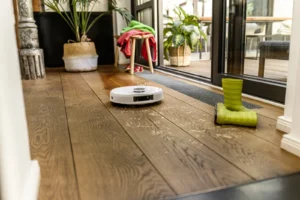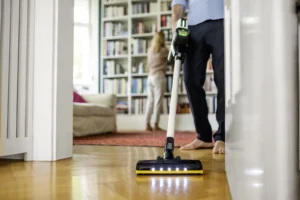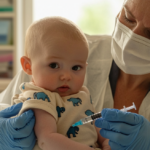
Rodzic helikopter – dlaczego nadopiekuńczy rodzice robią więcej złego niż dobrego dla swoich dzieci?
Spis treści:
Kim jest rodzic helikopter?
Autor określenia rodzic helikopter, Carl Honoré, autor książki „Pod presją. Dajcie dzieciom spokój!” bardzo dokładnie opisuje ten rodzaj nadopiekuńczości rodziców:
Rodzic helikopter nieustannie krąży nad głową swojego dziecka, nie dając mu ani chwili na nudę. Jego dziecko dostaje wszystko, zanim jeszcze o to poprosi – najlepsze zabawki, najdroższe atrakcje, najlepsze przedszkole, szkołę, zajęcia. Rodzic helikopter wyręczy dziecko we wszystkim, od prostych czynności domowych, przez zadania domowe, po organizację wyjazdów a później dorosłego życia.
Dzieci nadopiekuńczych rodziców, jeśli nie uda im się na czas wyrwać spod rodzicielskich skrzydeł, będą miały kłopoty z podejmowaniem decyzji, będą unikać wyzwań i konfrontacji, pozostaną mentalnymi nastolatkami nieprzygotowanymi do brania odpowiedzialności za swoje życie.

Cechy nadopiekuńczych rodziców
Gdyby nakreślić psychologiczny model rodzica helikoptera, okazałoby się, że nadopiekuńczość częściej występuje u matek jedynaka. Niewykluczone, że wychowują swoje dziecko samodzielnie albo mają za sobą długą historię poronień i strat. Z tego, ale także wielu innych powodów, przelewają na swoje dziecko całą uwagę.
Zaczyna się niewinne – matka helikopter już w niemowlęctwie projektuje całe życie swojego potomka. Zanim malec skończy dwa lata, ona stoi już w kolejce do najlepszego przedszkola w mieście, kilka lat wcześniej robi reaserch najlepszych szkół, walczy o najlepszych nauczycieli, lektorów, trenerów. By ułatwić życie swojemu dziecku, wyręcza je w każdej czynności, precyzyjnie planuje czas wolny, będzie wybierać tylko wartościowe atrakcje, dobrze rokujących kolegów, najlepsze korepetycje.
Rodzic helikopter doskonale wie, jaka przyszłość będzie dla jego dziecka najlepsza, zapłaci za najdroższe studia, wyśle na egzotyczny staż, wreszcie wybierze mieszkanie, a nawet wpłynie na założenie rodziny. Tak, tak – rodzic helikopter zazwyczaj krąży nad swoim dzieckiem przez wiele lat jego życia. Choć głośno się do tego nie przyzna, to w duchu nigdy nie uzna, że ten mały synek od dawna jest już całkiem dorosły a z czasem nawet stary.
Zaczyna się niewinnie i bardzo wcześnie. Rodzic helikopter małymi krokami wkracza w każdy aspekt życia swojego dziecka. Robi to w dobrej wierze i mając przyzwolenie otoczenia – wiadomo przecież, że małe dziecko jest zależne od rodziców, a świat, w jakim żyje, nie należy do bezpiecznych. Nie zauważa jednak, że jego dobrym chęciom i czynom towarzyszy:
- nadmierna kontrola edukacji;
- zmuszanie do nauki;
- stawianie wygórowanych wymagań;
- organizowanie czasu wolnego;
- wybieranie dziecku hobby, narzucanie zainteresowań;
- dobieranie odpowiednich kolegów;
- wyręczanie dziecka we wszystkich obowiązkach.
Nawykłe do poukładanego przez rodziców świata dziecko, kiedy wchodzi w okres dojrzewania, zazwyczaj nie przeżywa buntu nastolatka. Jest mu zwyczajnie wygodnie z mamą, która załatwi wszystkie sprawy i zadba o każdy aspekt życia. Rodzic helikopter zawsze będzie podejmował decyzje najlepsze dla dziecka:
- zaplanuje mu przyszłość;
- zdecyduje o przyszłej karierze i ścieżce edukacyjnej,
- wpłynie na wybór przyszłej pracy, niejednokrotnie nawet pomoże w jej zdobyciu;
- ułatwi start w dorosłość, kupując albo wynajdując mieszkanie;
- wpłynie na wybór partnera i zasady panujące w związku tworzonym przez dziecko.
Dlaczego helikopterowi rodzice szkodzą swoim dzieciom?
Czy rodzic helikopter zdaje sobie sprawę, że robi dziecku krzywdę? Zazwyczaj uważa, że jego troskliwość mieści się w granicach normy. Potrafi przekonująco wytłumaczyć swoje zaangażowanie, wmówi sobie i otoczeniu, że jego pomoc jest niezbędna.
Bardzo często pod szyldem troskliwego i uważnego rodzica kryje się rodzic lękliwy, zakompleksiony. Rodzic helikopter, przez to, że nie żyje własnym życiem, jest zazwyczaj bardzo samotny, nie ma własnego celu w życiu, własnych zainteresowań i potrzeb.
Skąd taki pomysł na wychowanie dziecka? Bardzo często u jego podstaw stoją wygórowane ambicje, poczucie niespełnienia, potrzeba awansu społecznego. Nadopiekuńczy rodzice niejednokrotnie wychowali się w domach, w których był niedostatek i zaniedbania wychowawcze. Kiedy mają swoje dzieci, za cel swojego życia i punkt honoru biorą sprawienie, by potomek miał życie łatwiejsze i mógł korzystać z wszystkiego co najlepsze.

Nadopiekuńczość i jej skutki dla rozwoju dziecka
Tymczasem nadopiekuńczość, choć wynika z troski, miłości i poświęcenia, może mieć destrukcyjny wpływ na rozwój dziecka. Rodzic helikopter wychowa dziecko, które będzie miało problemy z podejmowaniem decyzji, będzie niezaradne i nieprzystosowane do samodzielnego życia. Lista konsekwencji nadmiernej kontroli jest znacznie dłuższa. Dzieci wychowywane przez nadopiekuńczych rodziców:
- często nie potrafią podejmować własnych decyzji;
- nie mają doświadczenia w rozwiązywaniu problemów;
- nie są przygotowane do pogodzenia się z porażkami;
- nie mając możliwości samodzielnego działania, tracą wiarę w siebie i swoje umiejętności;
- przez całe życie szukają aprobaty u innych;
- mają trudności w relacjach z rówieśnikami, nie mają przyjaciół, nawet znajomych;
- nie potrafią wyrażać uczuć;
- mają problemy z nadmierną emocjonalnością;
- mogą mieć zaburzenia lękowe i depresję;
- szybko się wypalają wykonując pracę, której często nie lubią, narzuconą im przez rodziców.
Dorosłe dzieci nadopiekuńczych rodziców – jak sobie radzą w życiu?
W nadopiekuńczej rodzinie, choć z pozoru na pierwszym planie znajdują się potrzeby dziecka, w rzeczywistości rodzic helikopter zaspokaja swoje niezaspokojone potrzeby bycia ważnym potrzebnym i wszystkowiedzącym.
Co wyciąga dziecko z pozornie troskliwej opinii rodzica typu: zrobię to za ciebie, bo sobie z tym nie poradzisz? Trzeba bardzo silnej osobowości, by takie dziecko nie uważało się za głupsze, słabsze i niezaradne. Wmawianie dzieciom, że nie umieją niczego zrobić dobrze, nie znają życia, nic o nim nie wiedzą, to w praktyce podcinanie im skrzydeł.
Fatalne konsekwencje może mieć także pozornie chronienie dziecka przed popełnianiem błędów. W praktyce w dorosłość wchodzi człowiek kompletnie nieprzystosowany do samodzielnego życia, łatwowierny i podatny na manipulację.
Dziecko nadopiekuńczego rodzica na zawsze zostaje mentalnie na poziomie nastolatka. Nawet jeśli pozornie prowadzi własne życie, często ma własną rodzinę, tylko jego najbliżsi wiedzą, jak duże spustoszenie w zdrowych relacjach spowodowało wychowanie w nadopiekuńczym domu. Lista potencjalnych zaburzeń, jakie to może wywołać jest długa:
- zaburzenia osobowości,
- fobia społeczna,
- lęk uogólniony,
- napady paniki,
- depresja
- nerwica,
- brak pewności siebie,
- niska samoocena.

Jak unikać nadopiekuńczości? Jak znaleźć równowagę między troską a potrzebą kontroli?
Kluczem do unikania nadopiekuńczości jest znalezienie równowagi między wspieraniem a wyręczaniem. Żyjemy w czasach, kiedy opowieści o dzieciach biegających samodzielnie przed blokiem z kluczem na szyi, to wspomnienia pokolenia dziadków.
Współczesne dzieci dorastają w otoczeniu, gdzie potencjalnie, ale i realnie czyha na nie wiele zagrożeń. Większość dzieci jest odwożonych do szkoły i na zajęcia dodatkowe, niewiele ma ten przywilej, by droga do szkoły była w pełni bezpieczna. Także obecny styl życia nie sprzyja samodzielności dzieci i angażowania ich w obowiązki domowe. Warto jednak dla dobra dziecka wprowadzić kilka zasad, które pomogą mu uczyć się samodzielności, takich jak:
- zachęcanie dziecka do podejmowania części decyzji dotyczących jego spraw;
- dawanie mu możliwości wyboru zajęć dodatkowych i spędzania wolnego czasu, nawet jeśli chciałoby się w tym czasie nudzić;
- ustalenie jasnych granic i zasad dotyczących obowiązków, udziału w prowadzeniu domu i pozwalanie dziecku na samodzielność przy ich wykonywaniu;
- pomaganie w trudnych sytuacjach, ale nie wyręczanie dziecka;
- dawanie dziecku przyzwolenia na popełnianie błędów i akceptacja tych błędów;
- dawanie dziecku swobody i prawa do odpoczynku;
- rozmawianie i słuchanie, bez moralizowania;
- zapewnianie o wspieraniu i akceptacji;
- unikanie nadmiernego planowania jego życia zarówno w przedszkolu, jak i w dorosłym życiu;
- akceptowanie wyborów dziecka, nawet jeśli nie są zgodne z naszymi oczekiwaniami.
Naszym zadaniem jako rodziców jest wychowanie dziecka tak, by czuło się sprawcze, akceptowane i silne. Nadopiekuńczy rodzice powinni mieć świadomość, że kształtując niesamodzielne i niedojrzałe dziecko, skazują go na trudną dorosłość i powielanie własnych błędów wychowawczych.
Źródła:
- Justyniarski D., Zuchniewicz P., Wychowanie człowieka, czyli rodzice z wizją, Stowarzyszenie Wspierania Edukacji i Rodziny STERNIK, Warszawa 2022Warszawa 2022, https://kompetencjerodzicielskie.pl/pdf/wychowanie-czlowieka-broszura-net.pdf [dostęp: 28.02.2025].
- Buczak A., Łukasik I., Pułapki edukacji. Pasja, rozwój, motywacja a wolność dziecka, Kultura – Przemiany – Edukacja, tom specjalny, 2024.
- Honoré C., Pod presją. dajmy dzieciom święty spokój, Drzewo Babel, 2011.









































